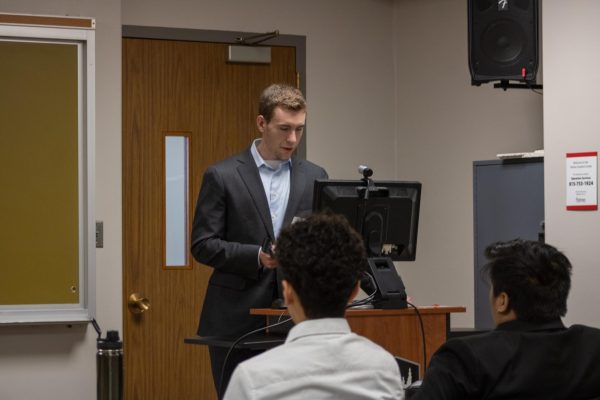Phone Booth
April 10, 2003
“Hitchcock always maintained he could make a film about a man in a telephone booth,” writes Sammy Davis Jr. in his autobiography, “Hollywood in a Suitcase.”
I’ve spent the past days pondering just what Alfred Hitchcock would have done differently if he had taken on the project instead of Joel Schumacher. I can see that film taking place with nothing more than the main character in the booth, with many shots from many different angles. A colleague brought up the thought of one shot, from the shooter’s perspective, that would last throughout the entire 80 minutes. That would take quite a story.
The plot of Schumacher’s “Phone Booth”: Stu Sheppard, jerk publicist, makes a daily effort to stop at New York City’s “last remaining phone booth” to call his mistress, taking his wedding ring off when he does so. On this fateful day, however, he gets an unexpected call from a sniper with a gun aimed right at him. If Sheppard leaves the booth or hangs up, he’s dead – unless he confesses all of his sins to his wife and the world.
-My colleague and I came to one conclusion: Hitchcock would need a much better script than the one provided here by Larry Cohen. That’s not to put down Cohen’s script; it’s perfect for director Joel Schumacher. He knows just how to work with this writing. Schumacher uses picture in picture, which gives the frame a certain pandemonium that matches the text’s climactic moments.
At this point in his career, Schumacher knows just how to make this movie and he knows just when to end it – before the men and women in the audience start checking their watches. The film’s leading man certainly helps keep the movie interesting.
Hitchcock wouldn’t need a better star than Colin Farrell. Again, the Irish wonder shows he has talent to match his new found superstardom – he absolutely carries this movie. Something tells me that if I sat back and read this script, I’d think it was a joke, but Farrell brings this character to life. We believe this character really would crack some jokes in this high-intensity situation. One moment, he yells to the watching crowd, “I lie so much I should be president,” or something along those lines.
Keifer Sutherland does his job as the shooter; his menacing voice is almost too perfect. Parts of me wonder why the shooter’s voice is represented non-diegetically. I rather would have heard his voice through the phone as Farrell hears it. But, this way we get to hear Sutherland’s deep, raspy voice projected through Dolby Digital (where available), and that may have a better effect on the audience. It can go both ways.
There isn’t much to complain about in “Phone Booth.” Sure, many parts of the film are illogical, especially its rapid conclusion, but it’s the perfect popcorn movie. It’s more entertaining than suspenseful, which could be a plus or a minus. The film doesn’t lay a perfect path for the audience to follow; we’re not sure just whom we should root for. This is what separates “Phone Booth” from other one-sentence, conventional thrillers, and Schumacher should be commended for it.
Maybe, just maybe, Hitchcock wouldn’t have been able to make a better film about a guy in a phone booth – nah, I’d rather see Hitch’s.













